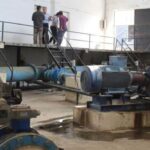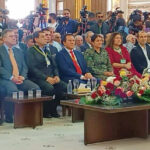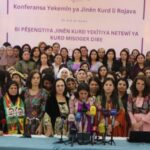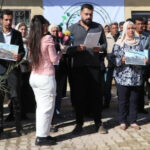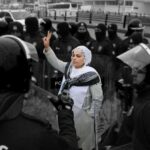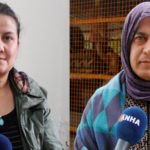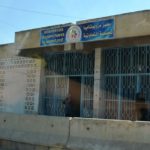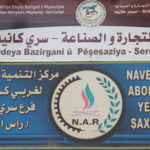Serekaniye appears on maps officially as Ras al-Ayn (Arabic: رأس العين, translit. Raʾs al-ʿAyn, Turkish: Resülayn, Kurdish: Serê Kaniyê, Classical Syriac: ܪܝܫ ܥܝܢܐ, translit. Rēš Aynā). It is a city in the Al-Hasakah Canton, in the Jazira Region of the Autonomous Administrations of North and East Syria. It lies on the border with Turkey.
One of the oldest civilisations in Upper Mesopotamia, the area has been inhabited since at least the Neolithic age (c. 8,000 BC). It has been Aramean, Roman, and Byzantine.
In 1921, the city was divided by the drawing of new borders that separated the new nation states of Turkey and Syria. Its northern part lies in Turkey and is officially called Ceylanpınar.
In 2005, Serekaniye was recorded as having a population of 29,347 Arabs, Kurds, Syriac, and a smaller number of Armenians and Chechens.
On the morning of 9 October 2019, Turkish state military forces began to bombard cities of Rojava – and also began incursions across the border, particularly in the region around Girê Spî and Serê Kaniyê, which are now under full occupation by Turkish forces.
Turkey has faced accusations of ethnic cleansing and war crimes, including the use of banned chemical weapons. On top of this, and emboldened by it, ISIS regaining strength in the region and sleeper cell attacks have increased by 48% since the start of the invasion.
The Turkish military and their allied Jihadist militias are attacking civilians, as well as military positions, with aerial bombardment and tanks on the ground; destroying hospitals, houses, electricity and water supplies. The illegal invasion has so far killed over 300 civilians, and around 300,000 people have been displaced.
Shortly before the Turkish invasion of Sere Kaniye and Tel Abyad in October 2019, both cities and their surrounding areas were a fertile home for a high concentration of cooperatives. Around Sere Kaniye, over 12,000 hectares had been given over to agricultural cooperatives. All cooperatives coordinated their activities, with some specialized in producing, others in buying and selling. The cooperative Hevgirtin united 1,250 members, cultivating barley on over 6000 hectares. The profits that the members of these agricultural cooperatives had put aside throughout 2015 and 2016 allowed them to open the cooperative Mesopotamia, a half-automated bakery. Such initiatives played a pioneering role in the cooperative economy of NES.
Turkey’s October 2019 invasion and ongoing occupation of 5000km2 in the Sere Kaniye and Tel Abyad regions destroyed this developing alternative economy. Turkish-backed forces plundered and looted private and public properties, businesses and cooperatives (for more information, see RIC’s December 2019 report: Turkey’s war against civilians). The Mesopotamia Bakery has been seized by Turkish-backed factions, resulting in the loss of machinery and reserves. Co-operative agricultural associations have also been plundered, with the total loss of 800 tons of wheat plus 1,500 tons of fertilizer from 6 cooperatives in the Sere Kaniye countryside. The psychological impact must be considered alongside the material damage: the experience or threat of destruction makes any attempt at building up future projects seem in vain.
Yet cooperatives develop even among those who have fled the war. The cooperatives bureau attempt to spark the creation of new villages by giving arable land to inhabitants who are living in IDP camps. In Heseke countryside, the Kaniya Jin cooperative brings together three families who fled the invasion of Sere Kaniye. They cultivate garlic and onions on one hectare of land.
Yet motivating the displaced to settle in a new place is difficult. Those who fled from Sere Kaniye prefer to stay in the IDP camp, as they hope to return one day to their homes. In other cases, therefore, cooperatives develop directly inside the IDP camps.
